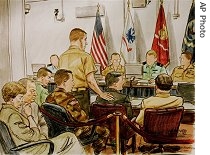2007年VOA标准英语-First Guantanamo Military Commission Hearing to(在线收听)
Washington
26 March 2007
An Australian detainee held by U.S. authorities at Guantanamo Bay, Cuba, is to be the first so-called enemy combatant tried under a new military commission procedure that was approved by the U.S. Congress last year. David Hicks, who was picked up by U.S. authorities in Afghanistan in 2001, is scheduled to be formally charged in a preliminary hearing Monday. VOA's Stephanie Ho reports from Washington.
 |
| Courtroom illustration, David Hicks (center) as his defense council US Marine Corps Maj. Michael Mori, stands, before military commission at Guantanamo Naval Base (Aug 2004) |
The long list of terrorism-related charges against Hicks has been reduced to the single charge of providing material support for terrorism. He will be the first Guantanamo detainee charged under new rules for military trials, which were adopted after the Supreme Court in June cast aside the previous system.
Hick's lawyers say he plans to plead not guilty.
The 31-year-old Hicks is a high school dropout and former kangaroo skinner, who converted to Islam in 1999. His father has said Hicks went to Afghanistan in early 2001 as part of a religious pilgrimage.
Court documents say Hicks was armed with grenades and an assault rifle, and had been trying to join the fight in Afghanistan for weeks, but apparently failed to win the confidence of his al-Qaida associates.
Human Rights Watch U.S. Advocacy Director Jennifer Daskal says the new military commissions are better than the old military tribunal system. But speaking by telephone from Guantanamo Bay, she said although the rules of the new military commissions are clearer, she has doubts about the fairness of the process.
"The rules that are laid out here raise serious concerns about whether or not these trials will be fair," she said.
Most importantly, she pointed to the use of evidence obtained through cruel, inhumane and degrading interrogation techniques, and rules that allow the U.S. government to conceal from the defense information about interrogation methods and activities.
She is among a group of non-governmental organization representatives and journalists who will be present in the hearing as observers.
In a VOA interview earlier this month, Human Rights Watch executive director Kenneth Roth said he believes the Guantanamo facility should be shut down.
"Guantanamo should simply be closed," he said. "I mean, it has become a symbol of injustice. It is a scar on America's reputation around the world. And there is no reason that anyone should continue to be held there. People should either be tried before a fair and proper tribunal, or they should be released."
In a regular White House briefing Friday, spokesman Tony Snow said he does not expect Guantanamo to be shut down before President Bush leaves office in January 2009.
"The fact that we have just begun a legal procedure that does take time, and in cognizance of the rights of those involved, there are still quite a number of detainees, and I am imaging that - and I think it's pretty solid ground, but you can certainly contact the Department of Defense, which is coordinating military commissions - it's highly unlikely that you can dispense with all those cases between now and the end of the administration," he said.
U.S. authorities say they plan to try as many as 80 of the 385 detainees being held at Guantanamo. Another 80 detainees have been approved for release or transfer to another country, pending the results of negotiations with those countries.